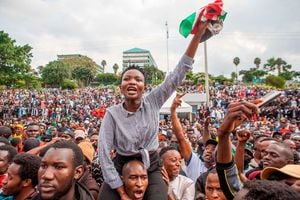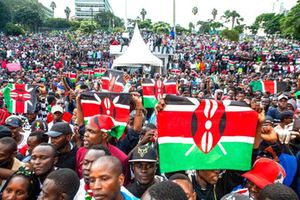
Students of Nginda Girls High School celebrate after being crowned winners of class 1034J, a choral verse during the 95th National Music Festival at Dedan Kimathi University in Nyeri County on 16 August 2023.
Kenya is on the threshold of seismic moral regeneration. On July 12, 2024, I was a guest speaker at an education forum on the role of education in fostering a value-based society. Billed as “Towards Value-based Holistic Education for Learners in Murang’a South” and held in Nginda Girls High School in Murang’a County, the forum brought back to mind Thomas Sankara, the pan-African icon and reformer, who changed his country’s name from Upper Volta to Burkina Faso (‘Land of Incorruptible People’) and its people to Burkinabé (‘upright people’) as part of his moral regeneration reforms.
The forum unfolded against the backdrop of the ongoing youth-led anti-tax revolt that started on June 18 and steadily morphed into a mighty movement for a value-based country, its leadership and society. At the heart of the revolt is public loathing of incompetence, corruption, extravagance and flagrant displays of wealth by government officials and well-connected politicians.
President William Ruto has aptly described the Gen-Z revolt as an inflection point, a moment when significant changes are occurring. The public debate in the wake of the Gen Z uprising is about competence, character and a value-based society. This calls for serious reflection on the role of value-based education.
Education means three things to a developing nation like Kenya.
Value-based education
First, a value-based education is a means or a pathway to an ethical end. For Kenya, this ethical end is the creation of a united, democratic, just, prosperous and genuinely free and sovereign nation. As the educationist, Paulo Freire, once asserted, “education is freedom.” Knowledge — practical or theoretical — acquired through learning unlocks the golden door to freedom. A value-based education moves a people from darkness to light. Moreover, education has been hailed as “the great equaliser of the conditions of men, the balance wheel of the social machinery.”
But access to quality education for all has been a challenge in Kenya, as elsewhere, across generations. At independence in 1963, the country started off with only 151 secondary schools, mainly public with a total enrolment of 30,120 students. To democratize access to education, communities fund-raised to establish harambee schools. Recently, Kenya has witnessed the phenomenal growth of private schools or academies. As a result, today Kenya has nearly 3,000 secondary schools with a total enrolment of 620,000 students. But value-based education is becoming a bridge too far due to inadequate funding of education, shortage of teachers and inadequate equipment and facilities.
Second, philosophically, a value-based education is an end in itself — it is a veritable product. The ultimate product of a value-based education is a ‘noble citizen’, a person of character, knowledge and skills useful to society and the world. Experience has shown that an education that just focuses on training the mind and not equipping the learner with morals ends up creating a personality that is a threat to society. Simply put, education without values creates a citizen who is a more clever devil! Inversely, a good value-based education produces a conscientious responsible citizen who is easy to lead but difficult to drive, easy to govern, but impossible to enslave. This appears to be the personality in the Gen Z revolt.
Finally, and related to the two above, a value-based education is a solution to great problems a society faces. Nelson Mandela hailed value-based education as “the most powerful weapon which you can use to change the world.” At independence, Kenya’s founding fathers saw education as the main weapon in the country’s war against the three foes of its people: ignorance, poverty and disease. Future generations have viewed education as an investment in knowledge and skills that would pay back manifolds.
However, far from paying off, a chronic lack of jobs and opportunities is turning investment in education into a ‘dead investment’. According to the Kenya National Bureau of Statistics, the number of Kenyans without jobs increasing to more than 2.97 million by the end of 2022.
This is rapidly turning Kenya’s youth bulge — the relatively large increase of young people — from a blessing to a curse. With nearly 80 per cent of Kenyans being less than 35 years old, Kenya’s youth cohort presents great economic and social opportunities.
Competence-Based Curriculum
Despite this, Kenya’s turn to value-based education has started. In 2017, the country unveiled its new Competence-Based Curriculum (CBC) to replace the 8-4-4 education system. The new curriculum is poised to produce a holistic Kenyan personality combining character, knowledge and skills in the digital age. The new ‘upright’ Kenyan will be digital savvy, armed with imagination, creativity, critical thinking and problem solving skills and imbued with the values of citizenship, patriotism, love, responsibility, collaboration, respect, unity, peace, and integrity.
However, the intense commercialisation and politicisation of education is a serious a stumbling block to a value-based education. In the 1980s and 1990s — rightly dubbed as the “Lost Decades” — the Structural Adjustment pressures by the World Bank and the international Monetary Fund (IMF) thrust Kenya’s education system into the marketplace.
Efforts by the political class to avoid the backlash from dwindling access to affordable education have resulted in a top-heavy wasteful and corruption-prone bursary system. By July 2024, the country has over 54 parallel government-funded bursary systems, including Higher Education Loans Board (HELB) Bursaries, 47 County Government Bursaries, National Government Affirmative Action Fund (NGAAF), Presidential Secondary School Bursary, Kenya Institute of Social Work and Community Development (KISWCD), Presidential Bursary Scheme for Orphans and Vulnerable Students and Higher Education Funding.
In the on-going reforms, the government should depoliticize the funding of education, immediately merge all bursaries into a single entity to fund free education for primary and secondary schools and provide scholarships and loans for tertiary and university education. This leaves bursaries to private foundations and charities. Besides returning sanity and predictability in the funding of education, the abortion of bursaries will minimize corruption and undue politicization of education.
Professor Peter Kagwanja is the Chief Executive at the Africa Policy Institute. This article is an excerpt of his remarks during the Murang’a South Education Day forum titled: “Towards Value-Based Holistic Education”, held at Nginda Girls High School, Maragua, July 12, 2024










